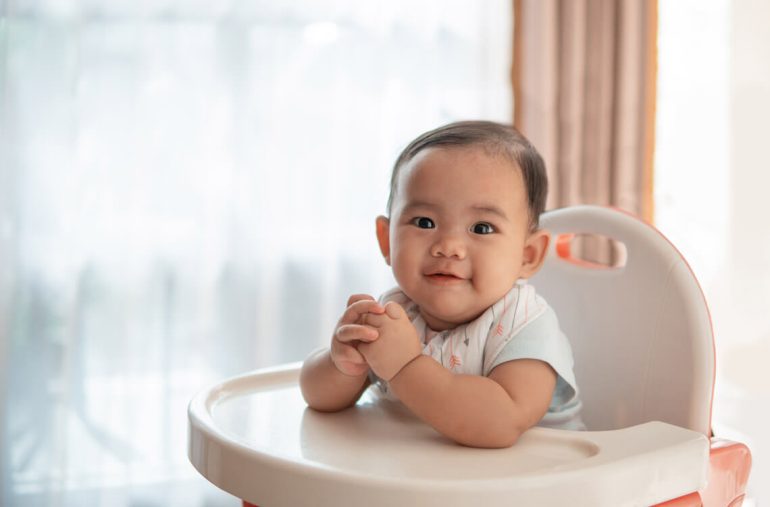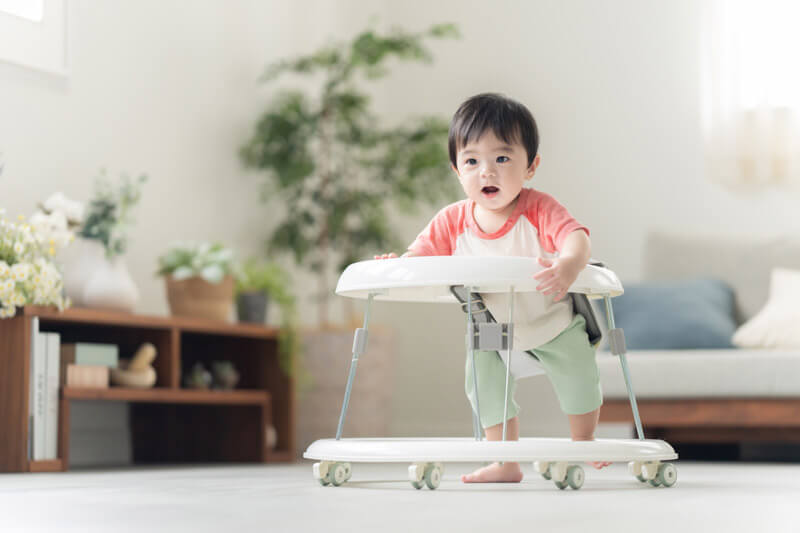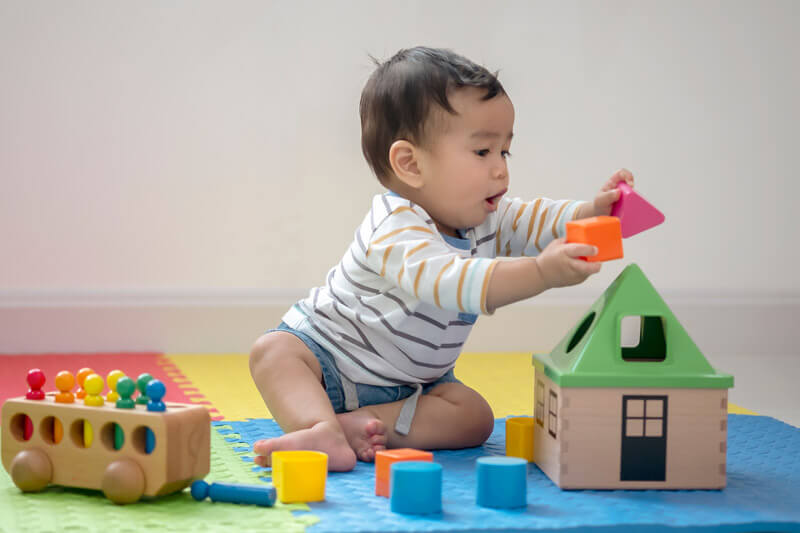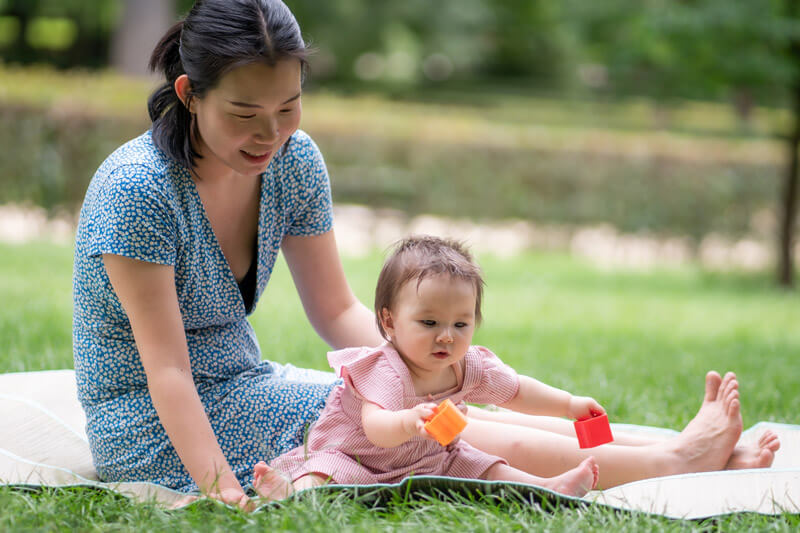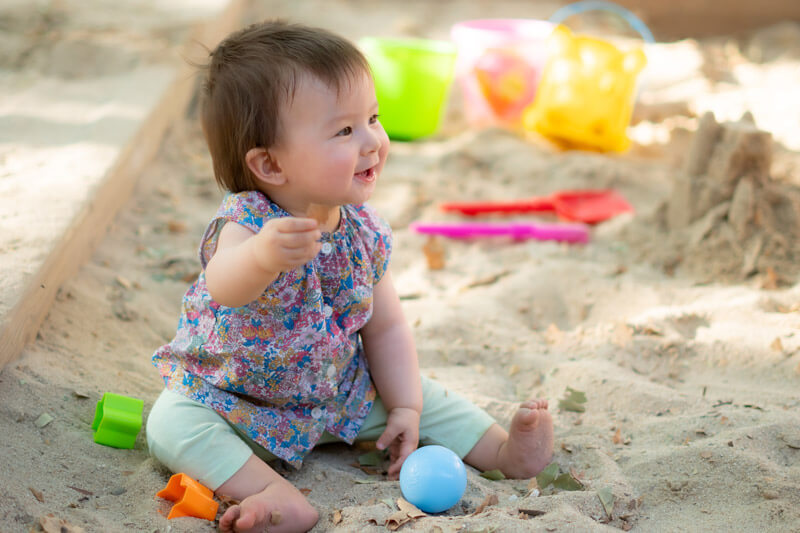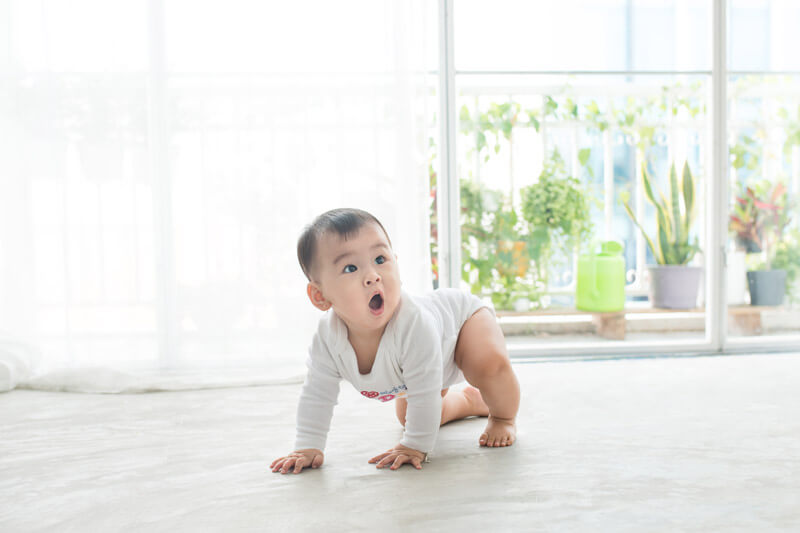Your baby is finally reaching their 8-month-old developmental milestones. They’re no longer content to stay in one spot.
Instead, they move with purpose, reach for new objects, and show off sharper attention spans.
This is also the stage where personality shines brighter: your baby may already have favourite toys, preferred foods, and even strong opinions about bedtime.
The eighth month often brings more mobility, more complex babbling, and more interactive social play.
Here are your baby’s 8-month-old developmental milestones for you to keep track of.
Physical & Motor Milestones
Becoming More Mobile
By eight months, many babies are on the move. Some scoot backwards, others belly-crawl, and quite a few start proper crawling on hands and knees.
A few adventurous little ones may even begin to cruise along furniture.
This increase in mobility is exciting but also means your home suddenly feels less baby-proofed than before.
Pulling Up and Standing Practice
Another thrilling milestone around this age is pulling up to stand. Babies may use low tables, sofas, or even your legs to rise up and practise balancing on their feet.
Though they’re not walking just yet, these wobbly standing sessions are key for strengthening leg muscles.
Offer sturdy furniture or toys designed for pulling up safely. When they plop down again, don’t worry; falling and trying again is part of the process
Communication & Cognitive Development
More Complex Babble
Eight-month-olds love to experiment with sounds. You may hear a jumble of syllables like “ba-da”, “ma-ma”, and “da-da”.
Even though these words don’t always refer to parents just yet, they’re the early building blocks of real speech.
Babies also begin to mimic the tone and rhythm of your voice. They may squeal, shout, or chatter in a way that sounds like a conversation.
Problem Solving and Memory
Your baby’s brain is working overtime this month. They now test cause and effect deliberately. Dropping toys and looking for them isn’t just play; it’s an experiment.
Object permanence—the understanding that things exist even when hidden—is also stronger now.
Games like peekaboo and hiding toys under blankets are not only fun but also build essential cognitive skills.
Babies also begin anticipating routines.
A smile when you put them in their high chair or excitement when they hear bath water running shows they’re connecting actions with outcomes.
Social & Emotional Development
Closer Bonds and Cautiousness
At eight months, many babies show deeper attachment to familiar carers. While this brings warm cuddles and recognition smiles, it can also lead to separation anxiety.
Your baby may cry when you leave the room or become clingy in new environments.
This behaviour, while sometimes challenging, is a healthy sign of strong attachment. To help, keep goodbyes short, introduce new faces slowly, and offer comfort when needed.
Babies thrive on consistency and reassurance.
Shared Attention and Play Cues
Your little one is also becoming more socially aware. They may point, gesture, or look back at you as if to share an experience. These “shared attention” moments are the first steps towards collaborative play and empathy.
Engage with their cues—copy their actions, play imitation games, and respond enthusiastically. Simple games like peekaboo or clapping songs are perfect at this stage.
These interactions teach turn-taking, emotional expression, and the joy of shared play.
Sensory & Perceptual Development
Exploring Taste and Texture
Solids are often well underway at this age. Babies explore foods not just for taste but also for texture.
They may mash soft foods in their hands, smear purées across their tray, or experiment with finger foods.
Though it’s messy, this exploration is important. Handling food helps them develop oral motor skills, fine motor coordination, and comfort with different textures.
Keep offering a variety of safe foods, even if they reject some. Early exposure builds long-term healthy eating habits.
Visual Detail and Spatial Awareness
Vision sharpens significantly by eight months. Babies see colour more vividly and recognise familiar objects from across the room.
Depth perception also improves, which explains why they now reach more accurately for toys.
Play with colourful books, rolling balls, and toys that move slowly across the floor. These simple activities improve visual tracking and spatial understanding.
Swapping out toys keeps curiosity alive and encourages ongoing exploration.
When to Talk to a Paediatrician
Every baby develops at their own pace, but it’s wise to speak with a doctor if your eight-month-old:
- still struggles with head or body control.
- rarely smiles, shows minimal interaction, or avoids eye contact.
- isn’t babbling or experimenting with varied sounds.
- doesn’t respond to movement or shows weak visual tracking.
- feels very stiff or unusually floppy during play.
Paediatricians can offer guidance, reassurance, or early support if needed.
If your little one is still having trouble reaching their 8-month-old developmental milestones, consult a paediatrician.
Expert Tips & Daily Activities
Create Safe Exploration Zones
Now that mobility is taking off, safe play areas are essential. Use baby gates, remove hazards, and give your baby free space to move.
A few favourite toys scattered around the room encourage them to pivot, crawl, and pull up.
Mealtimes as Learning Moments
Mealtimes aren’t just about filling tummies. They’re full of learning opportunities. Offer soft finger foods, introduce spoons for practice, and let your baby explore.
Talk about colours, shapes, and textures while they eat—it boosts both language and awareness.
Short, Focused Interaction Sessions
Babies thrive on multiple short bursts of activity rather than one long session. Incorporate reading time, songs, peekaboo, and stacking games into your daily rhythm.
Simple actions like clapping, waving, or rolling a ball back and forth also strengthen social and motor skills.
New Horizons Ahead
The eighth month is a whirlwind of change. Mobility expands, babbling becomes richer, and your baby’s personality blossoms with each passing day.
Their 8-month-old developmental milestones can feel both exhausting and magical, often at the same time.
Try not to worry if your baby’s development doesn’t match another’s exactly. Celebrate their progress, whether it’s pulling up to stand, saying a new syllable, or sharing a laugh with you.
With your steady support, encouragement, and love, your baby will continue to thrive.
Disclaimer: The information provided in this article is for informational purposes only and should not be considered as medical advice from Motherhood. For any health-related concerns, it is advisable to consult with a qualified healthcare professional or medical practitioner.
For more insightful stories and fun recipes, stay tuned to Motherhood Story!





